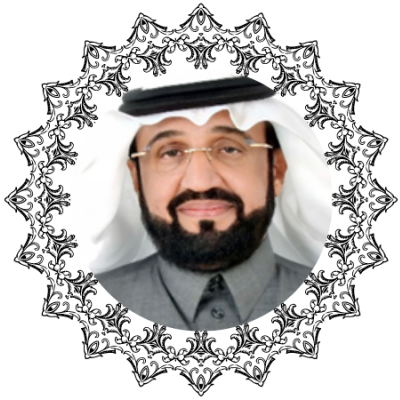
Prof. Dr.: Abdulaziz bin Abdullah Al-Shahrani
He is one of the graduates of King Saud University, in 1404 AH, specializing in physics and education, and was appointed as a lecturer in 1404 AH, and he obtained a master's degree from the Faculty of Science, King Saud University in 1409 ًAH, and was appointed as a lecturer, in the Department of Physics at King Saud University branch in Abha in 1409 AH. Then he studied his PHD in U.K. in solid state physics, and semiconductors, He received his doctorate in 1414 AH.
He was appointed head of the department for eight years, then he was appointed as an undersecretary for the College for technical affairs for two years, during which he supervised the faculties of engineering and computer science, then was appointed dean of scientific research for four years, then appointed director general for projects for four years, and then appointed as a vice-chancellor for projects at King Khalid University for three years.
From his biography, he had scientific contributions in the field of semiconductors through the study of the compounds of the second and sixth groups in the periodic table of elements, studying the growth of crystals with multiple techniques such as rigid and thin films, studying their applications as solar cells, studying synthetic, electrical, photonic and isolation properties, It was also able to purify crystals through the so-called vapour pressure in silica tubes that were highly vacuumed, and were able to manufacture special multi-thermal furnaces, and pass certain gases with a high degree of control, he build up his own labs, for this type of study, from scratch.
He also had distinguished studies in the research of conductive ceramics, such as Zn2SnO4, the study of the composition of the compound, and its structural and electrical properties in its rigid form and as thin films, and the invention of a new technique in vaporizing the compound as a thin film with complete control of the He also has studies of compounds with scientific applications in the field of manufacturing, the barium titanium compound BaTIO3, he has succeeded in forming the compound that achieves the phenomenon of positive thermal coefficient, and has wide-ranging applications in the field of thermal control. This compound has the property of an electric succession, to control thermo turbines, car engines and central boilers in service centers.
This extensive experience in this field resulted from the publication of a tens of scientific papers in international publishing vessels.He also has contributions to the service of society through his interest in the environment and radiation and their impact on humans. He has given a series of lectures on the impact of radiation on humans and the environment that have an awareness and educational aspect in cooperation with the Civil Defence and Abha Literary Club, the impact of high energy transmission lines and electromagnetic pollutants, how to deal with radioactive substances, and how to buildup data base for volunteers in this manner, and how His contributions were clear by chairing the committee for the establishment of the Community College in Bisha and Najran, which are the nucleus of the formation of those two universities with a distinguished elite of colleagues. He also had a prominent role in establishing and developing plans for the faculties of engineering and computer science and then supervising them in the most difficult years of establishment.
He had a prominent role in the establishment of the Saudi Society for Physical Sciences, and his participation was evident in the first meeting of the physics society One of the administrative contributions of Dr. Abdulaziz is to participate in supervising the international competition for the design of the university city in the two branches, and the membership of the committees that assumed that distinguished achievement. He also supervised and managed the stage of the designs of the university city, and then managed the university city project in the branches from its initial critical stages to 80% of the project.
He also had clear contributions to the permanent committees of the university in their various tasks and also worked several sessions in the Scientific Council.